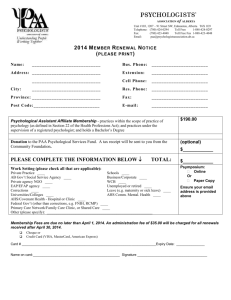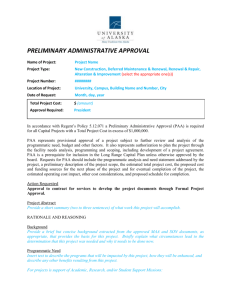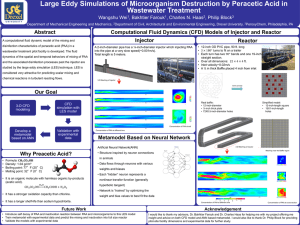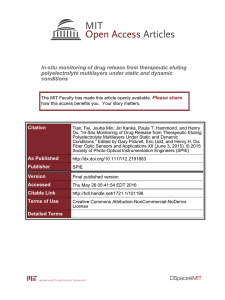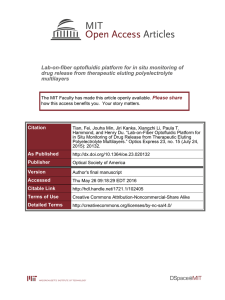• ECUR 340.3 Combination of ECUR 332.3 Safe &... ECUR 334.3 Methods of Teaching Practical and Applied Arts
advertisement
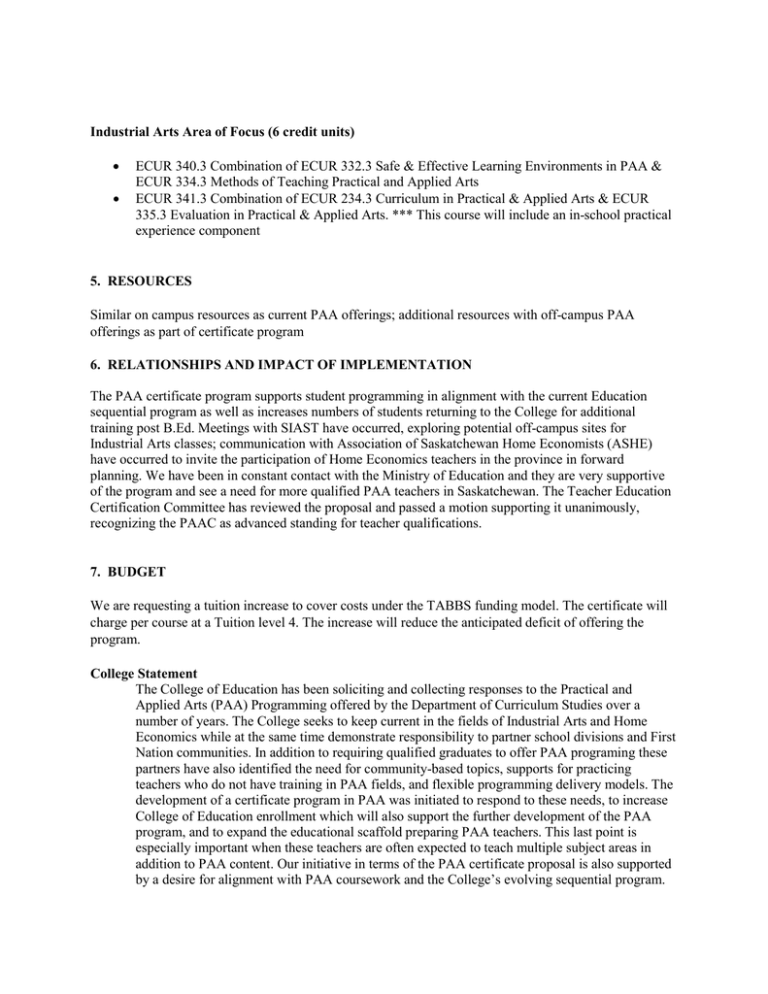
Industrial Arts Area of Focus (6 credit units) • • ECUR 340.3 Combination of ECUR 332.3 Safe & Effective Learning Environments in PAA & ECUR 334.3 Methods of Teaching Practical and Applied Arts ECUR 341.3 Combination of ECUR 234.3 Curriculum in Practical & Applied Arts & ECUR 335.3 Evaluation in Practical & Applied Arts. *** This course will include an in-school practical experience component 5. RESOURCES Similar on campus resources as current PAA offerings; additional resources with off-campus PAA offerings as part of certificate program 6. RELATIONSHIPS AND IMPACT OF IMPLEMENTATION The PAA certificate program supports student programming in alignment with the current Education sequential program as well as increases numbers of students returning to the College for additional training post B.Ed. Meetings with SIAST have occurred, exploring potential off-campus sites for Industrial Arts classes; communication with Association of Saskatchewan Home Economists (ASHE) have occurred to invite the participation of Home Economics teachers in the province in forward planning. We have been in constant contact with the Ministry of Education and they are very supportive of the program and see a need for more qualified PAA teachers in Saskatchewan. The Teacher Education Certification Committee has reviewed the proposal and passed a motion supporting it unanimously, recognizing the PAAC as advanced standing for teacher qualifications. 7. BUDGET We are requesting a tuition increase to cover costs under the TABBS funding model. The certificate will charge per course at a Tuition level 4. The increase will reduce the anticipated deficit of offering the program. College Statement The College of Education has been soliciting and collecting responses to the Practical and Applied Arts (PAA) Programming offered by the Department of Curriculum Studies over a number of years. The College seeks to keep current in the fields of Industrial Arts and Home Economics while at the same time demonstrate responsibility to partner school divisions and First Nation communities. In addition to requiring qualified graduates to offer PAA programing these partners have also identified the need for community-based topics, supports for practicing teachers who do not have training in PAA fields, and flexible programming delivery models. The development of a certificate program in PAA was initiated to respond to these needs, to increase College of Education enrollment which will also support the further development of the PAA program, and to expand the educational scaffold preparing PAA teachers. This last point is especially important when these teachers are often expected to teach multiple subject areas in addition to PAA content. Our initiative in terms of the PAA certificate proposal is also supported by a desire for alignment with PAA coursework and the College’s evolving sequential program. The College process for approval of the new Certificate involved approval at the departmental level through Curriculum Studies. Once approved by ECUR the proposal moved on to the Undergraduate Programs Committee and then to Faculty Council for final in-College approval. College of Education faculty voted to approve the new certificate at its November 7, 2014 meeting. Departmental Approval: Curriculum Studies Approval UPC Approval Faculty Council APC Summary of issues that the College discussed and how they were resolved from minutes. Minutes from the September meeting of the Department of Curriculum Studies: Minutes from the September meeting of the Undergraduate Programs Committee: Minutes from the October 3, 2014 meeting of Faculty Council: (See minutes from above meetings. Include relevant portions.) Related Documentation At the online portal, attach any related documentation which is relevant to this proposal to the online portal, such as: □ Excerpts from the College Plan and Planning Parameters: The new Certificate in Practical and Applied Art is responding directly to the third planning cycle’s Innovation in Academic Programs and Service to create more post degree certificates. This is part of the College of Education; College plan address’ the idea of ‘Changes in the Environment’ by allowing currently trained teacher’s access to our specialized program in Practical and Applied Arts. We hope to build on continuing activities and better serve our partners by having the certificate accessible to both those with a new and existing Bachelor of Education degree. This new program will assist us with facilitating our goal of promoting ‘lifelong learning’ for our alumni, a need expressed by our partner school divisions to allow us to capitalize on increased provincial government interest and funding. The certificate program will allow the College alternative delivery of existing courses, which will ensure accessibility to all programs including Sequential, ITEP & SUNTEP. The plan is that this template may allow the College to take these programs into the communities we serve, similarly to our communitybased programs supporting Priority #5 – Continue to develop and deliver high quality community-based undergraduate and graduate programs. The College does not currently have any full time faculty in either Home Economics or Industrial Arts streams and an alternative delivery would allow those currently in the field to deliver their expertise in an accommodating manner. Along with the creation of teachers with additional credentials, the College hopes that the Certificate begins to cultivate a database of expertise for graduate programming in this area. □ SPR recommendations
